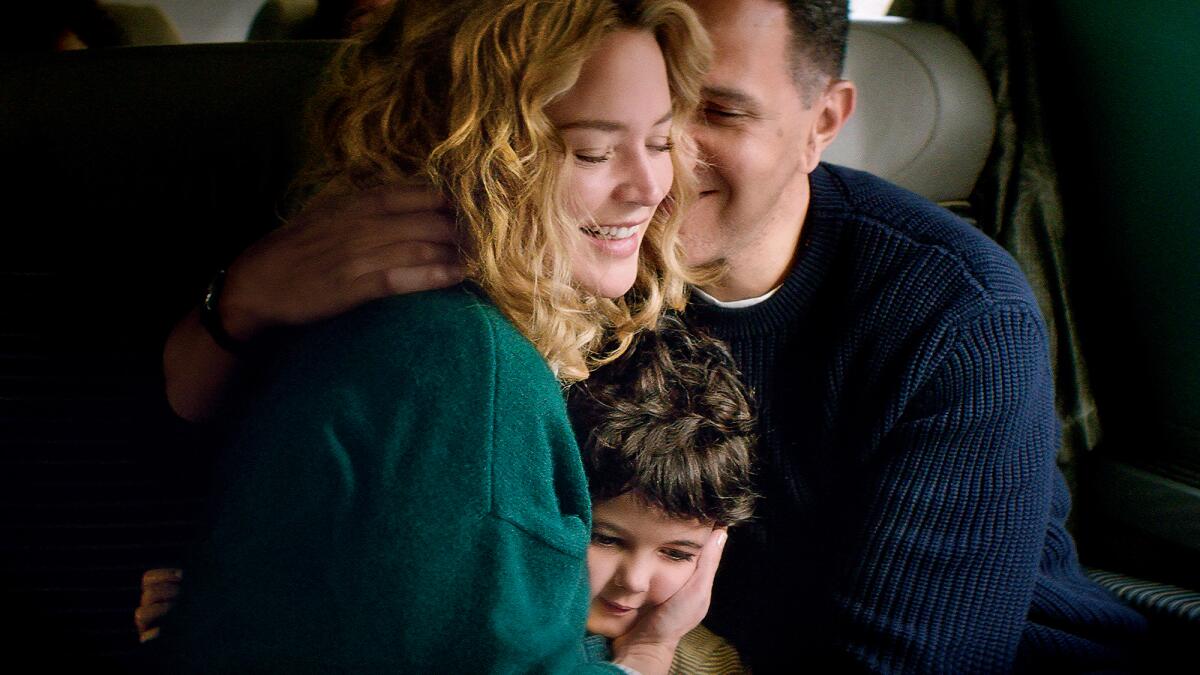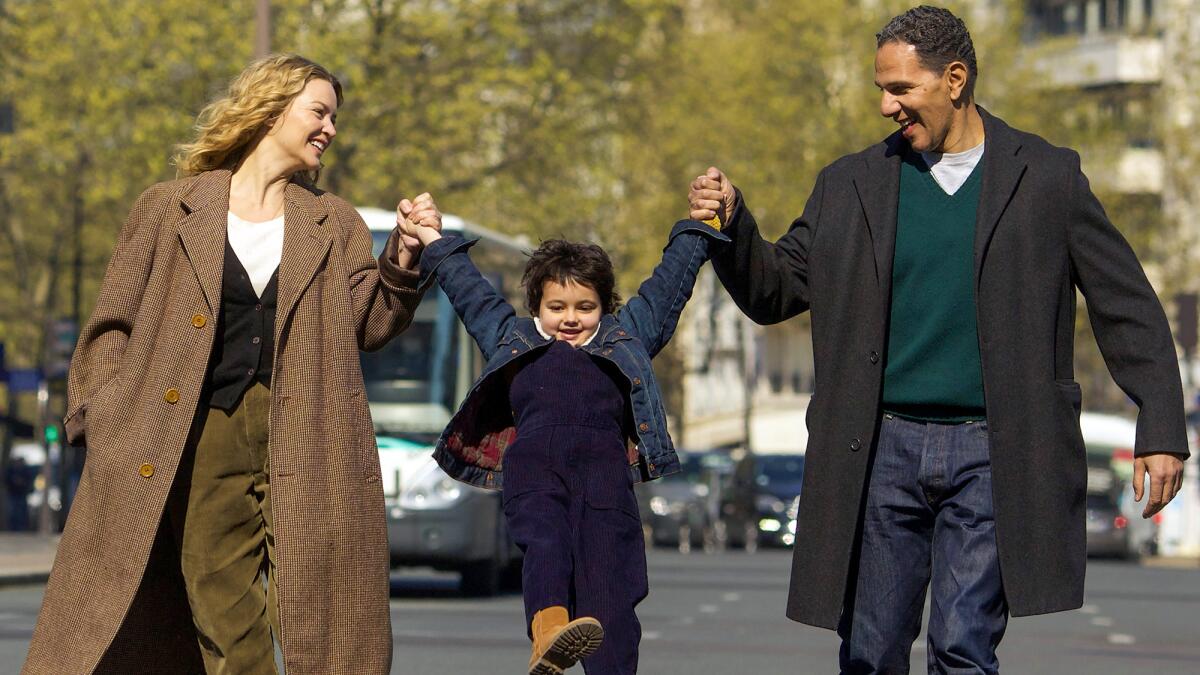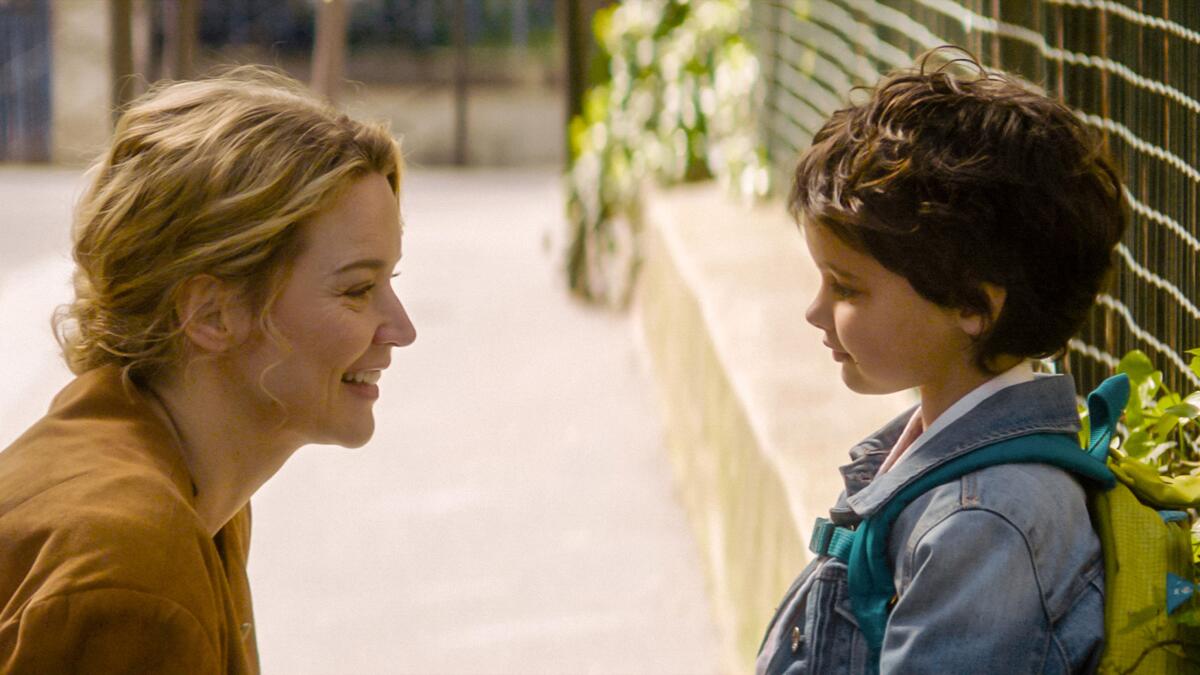Review: An outstanding French drama explores the joy and pain of ‘Other People’s Children’

- Share via
The superb French drama “Other People’s Children” opens on the Eiffel Tower at night — a timeless romantic image that floods you with warmth and maybe induces a chuckle. It’s a cliché, oui, but a wittily, knowingly deployed one. The tower’s famous beacon shimmers across the famous city that’s home to our radiantly beautiful 40-year-old heroine, Rachel (Virginie Efira), who makes her way through a busy, fulfilling life that plays, at first, like dreamiest fantasy. With deft, flowing camerawork and a burst of Vivaldi, the opening sequence finds Rachel teaching high-school students and chattering with colleagues, whisks her off on a quick car ride with a friendly ex, deposits her at an evening guitar class and ends with a drink and a tender smooch under the stars.
The passionate lovemaking that follows marks both a culmination and a beginning. Rachel’s lover is Ali (Roschdy Zem), a divorced industrial designer with a 4-year-old daughter, Leila (Callie Ferreira-Goncalves), whom he’s raising jointly with her mother, Alice (Chiara Mastroianni). It’ll be some time before Rachel meets Leila, a moment she eagerly anticipates but allows Ali to arrange only when he’s ready. Rachel is considerate and attentive to Ali’s needs, slotting herself in and out of his life at his convenience. That remains the case when Rachel starts spending more and more time with Leila, looking after the child when Ali’s away, picking her up at judo lessons and forging a bond as intense as it is ultimately fragile.
Unlike a lot of movie moppets, Leila is neither protagonist nor prop. As played by Ferreira-Goncalves, she’s a recognizably real kid, meaning she’s adorable, yes, and also shy, irritable, sweet, wary and unruly, with a love of sweets, a fondness for hugs and a tendency toward motion sickness. We see her only when Rachel sees her — a choice that underscores the tricky, conditional nature of a relationship that resists tidy labels.
Crucially, the writer-director Rebecca Zlotowski proves similarly unwilling to reduce Leila to an easy role or function; this child is neither the glue that holds Rachel and Ali together nor the wedge that drives them apart — not even when Leila inconveniently bursts into her father’s bedroom one night, sending a naked Rachel out onto the balcony. It’s a hilarious coitus interruptus sight gag with a hint of dramatic foreshadowing: Before long, Rachel’s connection with Leila will bloom into its own thorny, lovely and unpredictable thing, one that might even outlast the romance that breathed it into being.

Partly drawn from Zlotowski’s own personal experience, “Other People’s Children” sneaks up on you, with a depth and complexity of feeling that throws those glossy, idyllic opening moments into bittersweet relief. It is, like some of the filmmaker’s earlier movies (“Grand Central,” “An Easy Girl”), a story of unarticulated tensions and inconvenient desires, and it treats smart, self-aware, complicated female characters not as an accomplishment but as a given. Ali’s focus may be divided among the women in his life (“my ladies,” he calls them affectionately), but the movie grants all its time and attention to Rachel, whom Zlotowski and Efira reveal bit by bit, scene by scene.
Unfolding piecemeal in episodes that Zlotowski begins and ends with playfully old-fashioned iris shots, the story follows Rachel everywhere: to synagogue services with her father (Michel Zlotowski, the director’s dad), and to the grave of her mother, who died when Rachel was just a child. It drops in on an appointment with her gynecologist, played, in a dryly funny turn, by the great documentary filmmaker Frederick Wiseman — a whimsical touch that nicely encapsulates the movie’s dexterous interplay of realism and fantasy.
We see Rachel at her school, where she registers but gently deflects the flirtations of a young colleague (Henri-Noël Tabary) and goes out of her way to help an at-risk student, Dylan (Victor Lefebvre), who she knows is more than the sum of his truancies. Dylan, of course, adds a layer of meaning to the movie’s perfectly chosen title. So does Rachel’s younger sister (Yamée Couture), who learns she’s pregnant at more or less precisely the moment that Rachel considers having a baby of her own.
If that sounds like a pat irony on paper, it doesn’t play that way onscreen, in part because Zlotowski, taking her cues from her heroine, belabors nothing. Setbacks arise and plans fail, but Rachel, who’s seen triumph and tragedy, fulfillment and disappointment, knows something about taking the worst in stride. You sense this in her brusque dismissal of a disappointing home pregnancy test, and also in her swift, decisive departure from Ali’s apartment when she overhears young Leila saying that she wishes Rachel would go away. And yet Rachel also knows when to linger and give full expression to her emotions, whether she’s speaking out during a faculty meeting or greeting her baby niece for the first time — an overwhelming moment in which joy, grief and awe are irreducibly commingled.

Efira, a César-winning Belgian French actor of luminous presence and quietly limitless range, has been a sterling fixture of European cinema for years now. She’s best known in the U.S. for the comic thriller “Sibyl” and the lesbian-nun potboiler “Benedetta,” two very different movies in which she plays women fully alive to the world and eager to forge their own destinies, in part by studying and testing the limits of their desires. Rachel may be a more realistically grounded creation, but even here Efira does something similar: With a poise and control that can give way to sudden riptides of feeling, she shows us a woman doing nothing more or less profound than try to figure herself out, to make sense of the world and her place in it.
That determination speaks to the forthright feminism of Zlotowski’s storytelling, which manifests itself in a hundred different ways. It’s there in the seemingly throwaway moment when the camera, mirroring Rachel’s morning-after gaze, steals an appreciative glance at Ali’s backside in the shower. (The ever-alert cinematography is by George Lechaptois.) It’s there in the movie’s steadfast refusal to pit its heroine or the audience against Ali’s ex, Alice; in a story consciously devoid of villains, she turns out to be as unassuming, reasonable and wholly sympathetic as Rachel is.
Most of all, perhaps, it’s there in Rachel’s expressed longing for the pleasures of romance and the satisfactions of motherhood, but also her understanding that said longings, whether fulfilled or not, needn’t define or, in the end, constrain her. This deeply, stealthily affecting movie doesn’t constrain her, either. It concludes not with the Eiffel Tower but with a more personal kind of landmark, namely the hard-won sense that every difficult ending can also be an occasion for renewal.
‘Other People’s Children’
In French with English subtitles
Not rated
Running time: 1 hour, 45 minutes
Playing: Starts April 28 at Laemmle Royal, West Los Angeles
More to Read
Only good movies
Get the Indie Focus newsletter, Mark Olsen's weekly guide to the world of cinema.
You may occasionally receive promotional content from the Los Angeles Times.











